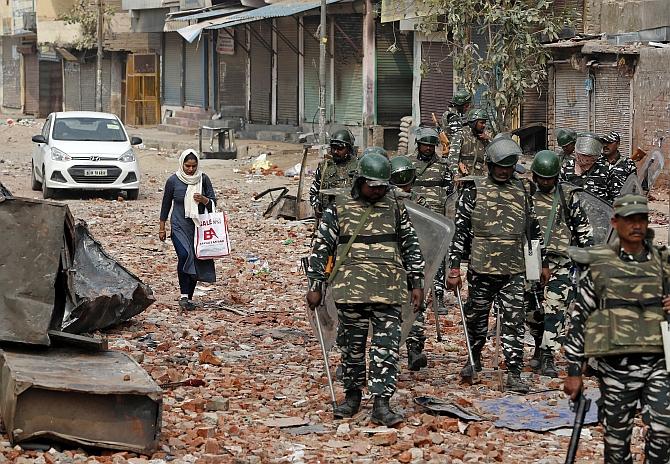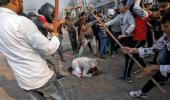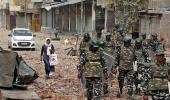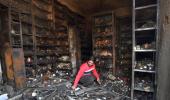'Especially at a time when truth is being twisted and a new narrative is being manufactured.'

Zafarul Islam Khan retired as the chairman of the Delhi Minorities Commission on July 19, 2020 after completing three years in office.
As the DMC chairman, Khan constituted a fact-finding committee, headed by M R Shamshad, advocate-on-record, Supreme Court of India, to look into the communal riots that engulfed north east Delhi between February 24 and 27, which led to the deaths of 53 people, mostly Muslims.
Just before his retirement, the 72-year-old journalist and author submitted a series of reports related to the welfare of minorities in Delhi, including the DMC Fact-finding Report on Delhi Riots 2020 to the government of Delhi and Lieutenant Governor Anil Baijal, squarely blaming the Delhi police for aiding and abetting the rioters who roamed the streets in communally-sensitive pockets in north east Delhi.
"We do not entertain great hopes, but truth had to be told (about the Delhi riots) and placed on record," Khan tells Rediff.com's Prasanna D Zore. The first of a two-part interview:
You retired on July 19 as the chairman of the Delhi Minority Commission after a stint of three years. How was the journey? Tiring, frustrating, satisfying?
It was a mixed bag. We were able to achieve a lot and this is shown in our three annual reports to the government of Delhi.
Hundreds of individual problems were solved by our intervention: some 14,000 OBC students got admission in Delhi university in 2018 when we intervened issuing an order that the university cannot ask students to produce fresh certificates if the applicants held valid OBC certificates at the time of application.
Erring police officers were punished; hate-mongers in media and social media were taken to task.
We started an awards scheme to honour exceptional achievers in minorities communities.
At the same we could not implement some plans and ideas due to stonewalling by the bureaucracy which thinks it is supreme while we think that the Act which created the (Delhi Minorities) Commission is supreme and it alone should be point of reference to decide the mandate and powers of the Commission.
We have asked the Delhi government to clarify this point.
What was your biggest challenge as DMC chairman?
The biggest challenge has been to get the government of Delhi to clarify who is supreme: The bureaucracy or the Commission's Act. This will solve many problems and let the Commission act according to its mandate specified in its Act.
Were you able to fulfill your mandate? Any incomplete project that you would have liked to complete before you retired?
We raced against time and despite the COVID-19 pandemic completed all our assignments and days before the end of our tenure presented to the government (of Delhi) four reports including our annual report for the last year and a fact-finding report on the north east Delhi riots.
You have stated that the Delhi police did not cooperate with the DMC's fact-finding committee on the riots that engulfed north east Delhi between February 23 and 27, 2020.
Why did the Delhi police refuse to heed your requests?
How did they try to scuttle this fact-finding committee under the chairmanship of M R Shamshad, advocate-on-record, Supreme Court of India?
They were asked by the Commission (the DMC) as well as by the fact-finding committee to provide certain details about the north east district riots, but they did not do so although they are duty-bound, as per the DMC Act, to supply the Commission with any information it asks for.
The DMC Fact-Finding Report on Delhi Riots 2020 has charged the Delhi police of aiding and abetting the rioters.
Nany, many, fact-finding committees before yours, like after the Delhi riots of 1984, the Mumbai riots of 1992-1993, the Gujarat riots of 2002 pointed out the same pattern of police involvement, aiding and abetment, no serious punitive action was ever taken against any policeman in any of these riots.
Can your committee's report buck this trend?
We do not expect that this report will change this trend because governments have their way in these matters where politicians are involved, but at least an official version is out and will remain a reference point for many years.
While you have submitted your report to the Delhi government, do you really believe any action will be taken against the actual perpetrators of the Delhi riots, their political masters? In this respect, what purpose do such fact-finding commissions serve?
We do not entertain great hopes, but truth had to be told (about Delhi riots) and placed on record especially at a time when truth is being twisted and a new narrative is being manufactured.
What kind of obstructions/challenges did you and your team face from government institutions right from February 27 when you asked the Delhi government's revenue minister to grant permission to constitute a fact-finding committee?
Why do you think the revenue minister refused to reply to your letter?
We do not know why the revenue minister chose not to reply.
In any case, from February 24 itself, our commission intervened forcefully to stop the riots and later to secure justice for the victims, details of which are found in our annual report for 2019-2020.
Why couldn't your fact-finding commission get any cooperation from the Delhi police? Under what powers did the Delhi police refuse to cooperate with this commission?
Ghe Delhi police has no legal power to deny us the information we asked for but, we think, when higher authorities are interested, the police can ignore Commission orders.
What are the commission's major recommendations that can help the riot victims get justice or give them hope that such a fate wouldn't befall them in the future?
These are mentioned in detail in the relevant section of the report. Broadly, it seeks to ensure justice for the victims, fair compensation to the victims and punishment of the planners and executors of the riots.
You have been booked under charges of sedition -- Sections 124A and Section 153A of the Indian Penal Code -- by the Delhi police and you have been granted reprieve from arrest till July 31 by the Delhi high court.
Are the Delhi police being vindictive against you?
Has your counsel got the status report from the Delhi police?
Do you, in hindsight, regret your April 28 tweet?
I think my tweet did not deserve all this attention, but since a political lobby was peeved at my actions as the head of the Delhi Minorities Commission and was waiting for an opportunity to punish me and deny me another term which was a foregone conclusion before this controversy.
The tweet gave them the handle they were waiting for.
With hindsight, I think that that tweet was unnecessary and thoughtless. I was acting as a writer and journalist who momentarily forgot that he was also head of a statutory body.
Only two days after this tweet, I said it was ill-timed and insensitive. But the powers that be were adamant to punish me and a very high level intervention ensured that a complaint against me be forwarded to the special cell of the Delhi police which looks after serious cases like terror and narcotics. The police are yet to file a chargesheet.
Earlier you said that the Delhi police did not give you the details that the fact finding commission sought from it. What reasons were put forward by the Delhi pplice?
They did not say anything. They simply did not reply to our request.
Could the DMC then not have take action against the Delhi police?
We could have taken action, but we did not.
Why? What happened?
We were too busy; too busy with many things. Then there was the lockdown and these people (the commission members) were also in a hurry to complete their report. Because of the lockdown they were already delayed too much.
We could have taken action, of course.
The Commission (the DMC) has powers, but we were too busy. The Commission also was not working properly because of this lockdown.
People were not coming (to the DMC office/em>); maybe for two-and-a-half months, we were closed and actually working from home. Those were extraordinary times.
Why do you think that the Delhi police refused to part with the details you needed? Under whose pressure?
I can't say anything. They should know better (under whose pressure did they refuse to heed our requests). I don't know, but this is what has happened.
Do you believe that this was because of political pressure?
I don't know under whose pressure, but of course, nothing happens in a vacuum. It must have happened and then things don't work in normal course.
Even in the case of an FIR registered against me, normally it should go to a police station closest to me (where I stay). That is what should have happened normally. But in my case it goes to the special cell of the Delhi police.
In my case there is somebody who is very much interested to make it a big issue.
So there must be people (who have pressurised the Delhi police from sharing details, records related to the north east Delhi district riots), but I don't know (who).
Don't the Delhi police work under the jurisdiction of the Union home ministry?
They are accountable to the Union home ministry and take their orders from there, but in Delhi, they are also accountable to the lieutenant governor of Delhi, which also (works) under the (Union) home ministry.










